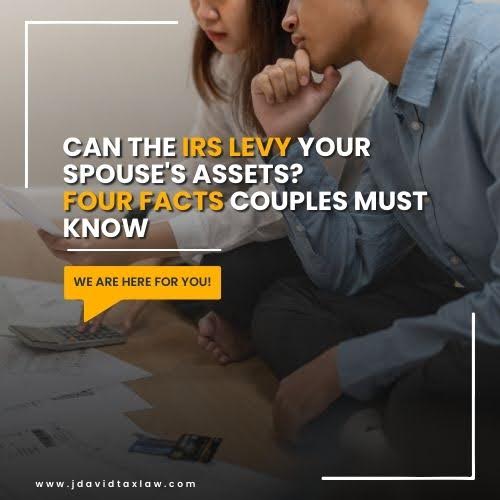Can the IRS Levy Your Spouse’s Assets? Four Facts Couples Must Know
Many couples are concerned about how the Internal Revenue Service (IRS) might target their assets when facing tax issues. The possibility of an IRS levy—where the government seizes property to satisfy a tax debt—can be particularly stressful. This worry often extends to whether the IRS can levy a spouse’s assets, even if they aren’t directly responsible for the tax debt.
On top of this, tax law is intricate and constantly changing. Thus, understanding your rights and obligations is essential to safeguard your finances.
Read on as we break down the top 5 critical facts that every couple must know about IRS tax levies.
Understanding IRS Levies
An IRS levy is a powerful tool that the IRS uses to collect outstanding tax debts. When the IRS issues a levy, it can legally seize your property to satisfy your tax obligation. This can include bank accounts, wages, vehicles, real estate, and other personal property.
Once your assets are levied, it also gives the IRS the liberty to use them to pay off what you owe. This can be a drastic measure, often taken when other attempts to collect the debt have failed.
Here are the 3 most common reasons for IRS levy:
Failure to pay your taxes on time.
Ignoring multiple notices and demands for payment from the IRS.
Not responding to a notice of intent to levy.
Failure to pay your taxes on time.
Ignoring multiple notices and demands for payment from the IRS.
Not responding to a notice of intent to levy.
Take note that a levy is different from a lien. While a lien is a legal claim against your property as security for a tax debt, a levy takes the property to pay off the debt.
Four Facts Couples Must Know About IRS Tax Levies
Fact 1: Joint Tax Liabilities
Filing a joint tax return can offer several benefits, such as lower tax rates and higher income thresholds for certain deductions and credits. However, it also means that both spouses are legally responsible for the entire tax debt.
If the IRS determines that additional taxes are owed, they can pursue either spouse for the full amount. This includes the ability to levy assets like bank accounts and wages that belong to either or both spouses. The same joint responsibility extends to penalties and interest that accrue on the tax debt.
For example, if one spouse has individual assets, those could be at risk – even if the other spouse is primarily responsible for the tax debt. This can create financial strain and complicate finances between spouses about tax issues.
Fact 2: Separate Tax Liabilities
While filing jointly can offer certain benefits, there are situations where filing separately might be the better option for some couples.
When spouses file separate tax returns, each is only responsible for their own tax liabilities. However, if one spouse incurs unpaid taxes, the IRS cannot typically pursue the other spouse’s separately owned assets to satisfy that debt. However, if assets are jointly owned or if the IRS determines that funds were commingled, those assets may still be at risk.
Below are the key considerations for filing separately:
One Spouse Has Significant Medical Expenses or Miscellaneous Deductions
Separation or Divorce
Protection from a Spouse’s Tax Issues (In Some Cases)
Important Note: Filing separately can also result in higher tax rates and the loss of certain tax benefits, including the Earned Income Tax Credit and certain higher education tax credits. Additionally, in community property states, a portion of one spouse’s income may still be considered joint property, making it subject to IRS collection efforts for the other spouse’s tax debt. Couples should weigh these factors carefully before deciding to file separately.
Fact 3: Impact of Previous Marriages
Tax liabilities from previous marriages can sometimes create complications for a couple’s current financial situation. The IRS cannot hold a new spouse responsible for a former spouse’s tax debts unless assets are jointly owned or the new spouse was involved in the prior tax obligations.
To protect yourself from any potential tax liabilities your partner brings, consider the following strategies:
Separate Bank Accounts
Clear Ownership of Assets
Prenuptial Agreement
Fact 4: Innocent Spouse Relief
One of the most important protections available to spouses facing tax issues is the Innocent Spouse Relief.
Innocent Spouse Relief is a provision that allows a spouse to be relieved of responsibility for paying tax, interest, and penalties. This applies if their spouse (or former spouse) improperly reported items or omitted items on their tax return. It is designed to protect spouses who were unaware of the errors or misreporting that led to the tax liability.
Listed below are the following criteria to qualify for:
Filing a Joint Return: You must have filed a joint tax return that has an understatement of tax due to erroneous items of your spouse (or former spouse).
Lack of Knowledge: At the time you signed the joint return, you must have been unaware, and had no reason to know, that there was an understatement of tax.
Equity Considerations: Taking into account all the facts and circumstances, it would be unfair to hold you liable for the understatement of tax.
If innocent spouse relief is granted, the IRS is required to release those levies and return the funds or property seized. Once relieved, you are protected from future levies related to the tax debt incurred due to your spouse’s errors.
What to Do When the IRS Levies Your Spouse’s Assets?
Facing an IRS levy on your spouse’s assets can be a stressful and daunting experience. It’s crucial to know the steps you can take to protect your finances and navigate this challenging situation.
Here’s what to do when the IRS levies your spouse’s assets:
1. Contact J. David Tax Law Immediately
Your first and most crucial step is to contact J. David Tax Law as soon as you receive notice of the levy.
J. David Tax Law specializes in tax resolution and can provide expert guidance on how to handle the IRS levy. Their tax attorneys will analyze your situation, explain your options, and develop a strategy tailored to your needs.
The firm’s attorneys are skilled in negotiating with the IRS to secure relief options such as installment agreements, offers in compromise, and innocent spouse relief.
2. Request a Collection Due Process (CDP) Hearing
With the assistance of J. David Tax Law, you should request a CDP hearing. This hearing allows you to present your case to an independent officer who can review the levy and determine if it is appropriate.
During the hearing, they’ll propose alternative solutions to relieve you from the tax issue. This includes an installment agreement or an offer in compromise. Your attorney will help articulate why these alternatives are more appropriate and manageable for your situation.
3. Protect Your Spouse’s Assets
While navigating the CDP hearing or any appeal process, take steps to protect your spouse’s assets.
Separate Bank Accounts: Ensure that bank accounts are maintained separately to prevent the IRS from accessing your personal funds for your spouse’s tax debt.
Clear Ownership Records: Clearly delineate ownership of significant assets such as real estate, vehicles, and investments. Ensure that titles and ownership documents reflect individual ownership where appropriate.
Innocent Spouse Relief: Apply for innocent spouse relief with the guidance of J. David Tax Law. This can relieve your spouse from being held responsible for the tax debt incurred.
Conclusion
Dealing with an IRS levy on your spouse’s assets can be a daunting and stressful experience. However, taking the right steps can protect your assets and allow you to navigate this challenging situation effectively.
By partnering with J. David Tax Law, you can work towards a resolution that prioritize your financial security and peace of mind. If you’re dealing with an IRS levy, reach out to J. David Tax Law today to resolve your IRS tax levy in no time.
Your Tax Relief Questions, Answered
A portion of your paycheck is sent directly to the IRS to satisfy your tax debt. The levy continues until the debt is fully paid or other arrangements are made. The wage garnishment amount is based on your filing status and number of dependents. Thus, leaving you with a reduced amount of disposable income.
If you can’t pay your tax debt, you should contact the IRS immediately to discuss your options. Consider setting up an installment agreement to pay off the debt over time or applying for an Offer in Compromise to settle for less than the full amount. You can also request Currently Not Collectible Status if you’re experiencing financial hardship. Consult with a tax debt attorney from J. David Tax Law to determine your best option.















